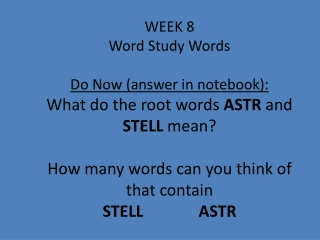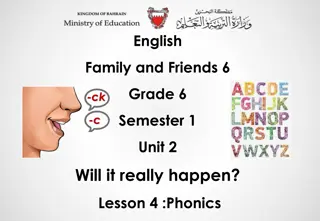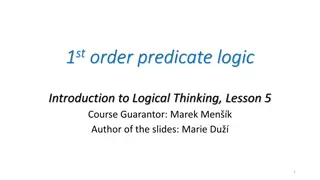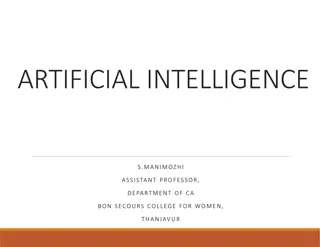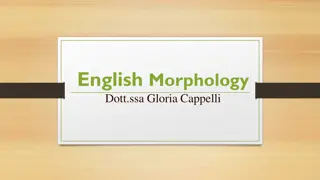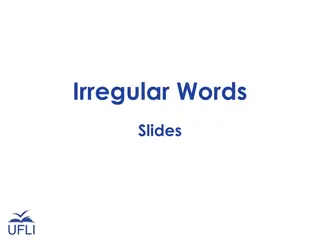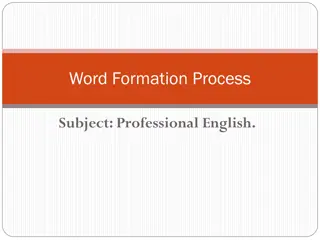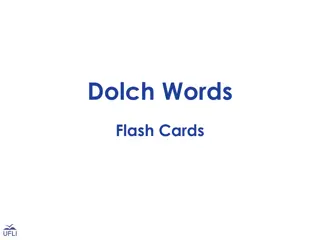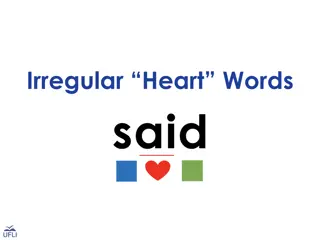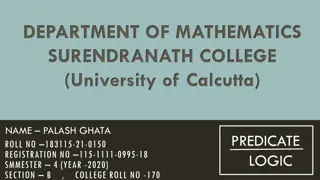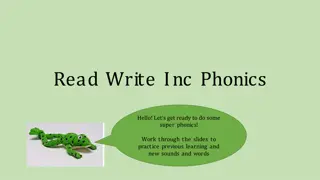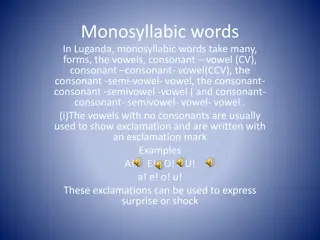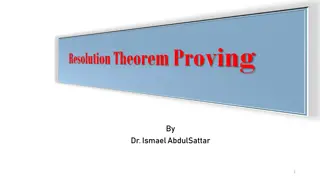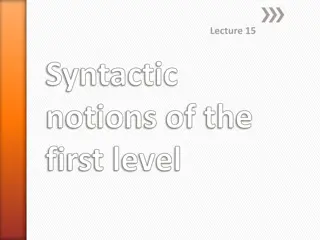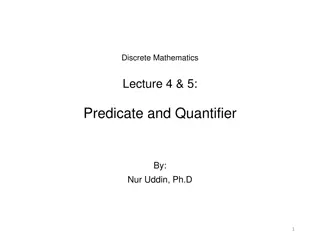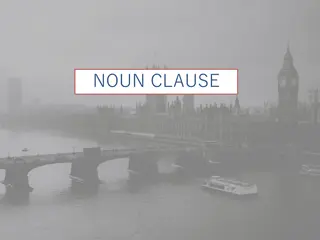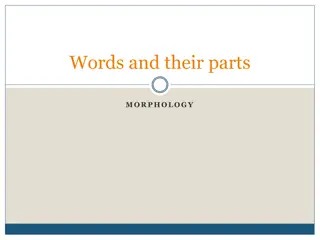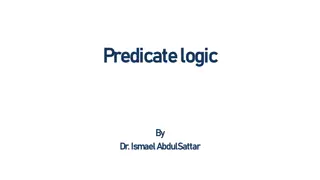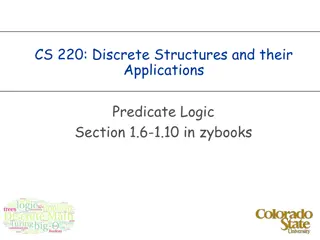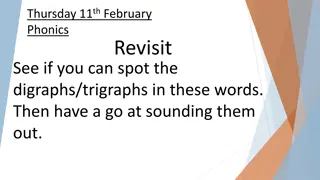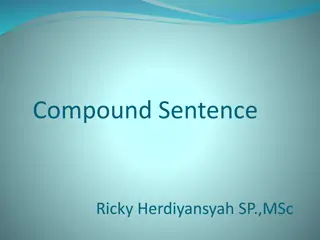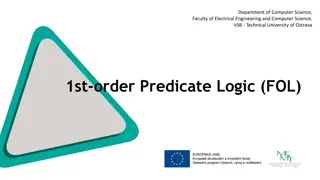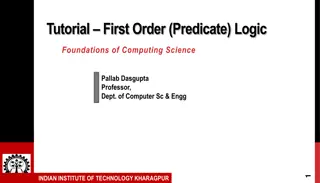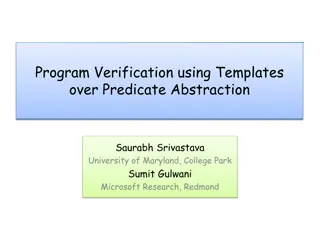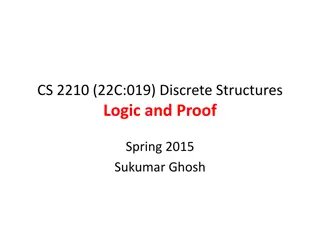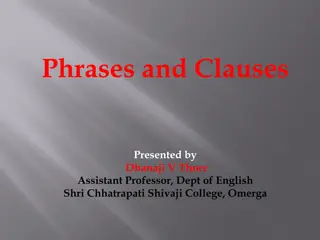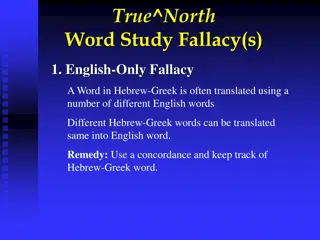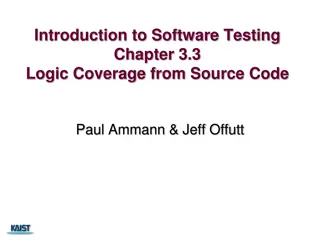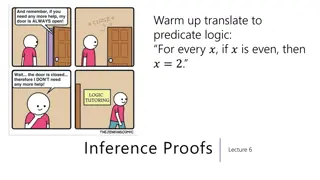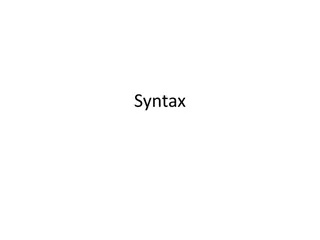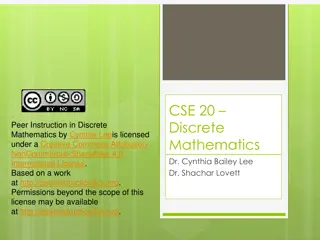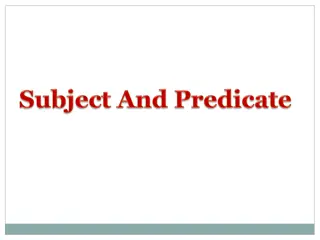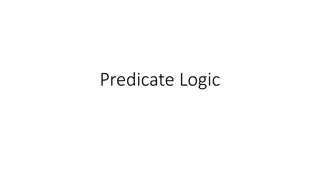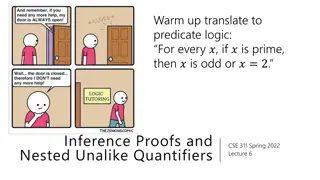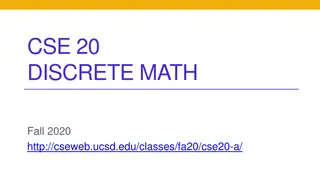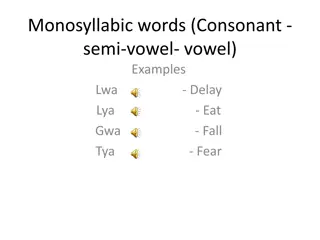Explore Root Words ASTR and STELL
Uncover the meanings of the root words ASTR and STELL through words like astronomy, asteroid, stellar, and more. Delve into the world of stars and star-like objects through words that are rooted in ASTR and STELL.
34 views • 14 slides
Phonics Lesson for Grade 6: Words ending with "-ck" and "-c
This lesson focuses on identifying and spelling words ending with "-ck" and "-c," as well as using them accurately in sentences. Students will practice words like duck, picnic, music, neck, plastic, comic, rock, and clock. Activities include completing words with "c" or "ck," practicing spelling, an
1 views • 9 slides
Introduction to 1st Order Predicate Logic in Logical Thinking
Explore the limitations of propositional logic and the enhanced expressive power of 1st order predicate logic (PL1). Understand how PL1 allows for analyzing the structure of atomic propositions and proving arguments that depend on these structures. Through examples and valid argument schemata, delve
1 views • 26 slides
Understanding Predicate Logic in Artificial Intelligence
In the world of artificial intelligence, predicate logic plays a crucial role in representing simple facts. It involves syntax, semantics, and inference procedures to determine the truth value of statements. Real-world facts are represented using propositions in logic, allowing for structured knowle
1 views • 19 slides
Understanding Linking Verbs and Predicate Words in English Grammar
Linking verbs connect the subject of a sentence with a predicate word, while predicate words follow a linking verb to identify, rename, or describe the subject. Learn about sentence patterns, forms of linking verbs, and how to differentiate between linking and action verbs. Understand the role of pr
1 views • 31 slides
Understanding English Morphology: The Study of Words and Meaning
English Morphology delves into the structure of words, exploring morphemes as the building blocks of linguistic meaning. From free morphemes like "certain" to bound morphemes like "-ly," the discipline uncovers how words are constructed and adapted grammatically. By examining the derivational and in
0 views • 49 slides
Irregular Words: Learn and Review Commonly Used Words
This text provides a list of irregular words commonly used in English. It includes words like "the," "has," "were," and "know." Practice and remember these words to improve your vocabulary and language skills.
0 views • 169 slides
Various Word Formation Processes in Professional English
Coinage, Borrowing, Compounding, Derivation, Blending, Backformation, and Acronym are key mechanisms for forming new words in Professional English. Coinage involves inventing new words, Borrowing uses words from foreign languages, Compounding combines words to create new ones, Derivation adds prefix
0 views • 11 slides
Dolch Words Flash Cards: Pre-Primer Level Vocabulary
Explore a collection of Dolch words flashcards, including common words like "the," "to," "and," "a," and more. These vibrant images provide an engaging way to learn and practice essential pre-primer level vocabulary words. Enhance your reading and language skills with this visual learning resource.
0 views • 226 slides
Understanding Irregular Heart Words in Teaching
Exploring the concept of irregular heart words in teaching where common words present challenges due to irregularities in letter-sound correspondences. Learn how to help students decode and master these irregular words effectively through targeted activities and teaching tips.
0 views • 181 slides
Study Skills for Natural Disasters Unit 8: Compound Words and Word Division
Enhance your study skills with the Unit 8 curriculum focused on compound words, word division, and vocabulary building. Engage in pre-tasks related to family dynamics, household chores, and countryside settings. Practice dividing words and forming new words while expanding your vocabulary in an inte
0 views • 24 slides
Adding -ing to Words Ending in -e with a Consonant: Spelling Rule Activity
Explore the spelling rule of adding -ing to words that end in -e with a consonant before it through engaging activities like spellings, word cards, and detective work. Reinforce the concept by practicing with words like hike, shine, joke, and more. Encourage children to discover how to transform roo
0 views • 8 slides
Introduction to Predicate Logic in Mathematics
Predicate logic is a powerful tool used in mathematics to express complex relationships and assertions that cannot be adequately represented by propositional logic. It allows for the quantification of statements over a range of elements using predicates and quantifiers like universal and existential
1 views • 13 slides
Super Phonics Practice with Read Write Inc Phonics
Join in for an engaging session to work on previous and new sounds and words through interactive slides, including Speed Sounds, Red Words, reviewing word patterns, practicing new sounds like "ew" and "oo," and identifying grotty graphemes in red words. Enhance your phonics skills and spot new words
0 views • 12 slides
Understanding Monosyllabic Words in Luganda
Monosyllabic words in Luganda come in various forms, including vowels as exclamations or questions, consonant-vowel words with complete meanings, nasal-consonant-vowel words, double consonant-vowel words, and more. These words play different roles in expressing surprise, asking questions, or conveyi
0 views • 8 slides
Understanding Resolution Theorem Proving in Predicate Logic
Resolution theorem proving is a method used in predicate logic to find contradictions within a database of clauses. By negating statements and applying resolution rule of inference, it aims to show inconsistency to prove the original theorem. The process involves putting premises into clause form, a
0 views • 24 slides
Syntactic Notions of the First Level in Linguistics
In this lecture, the syntactic notions of the first level in linguistics are discussed, focusing on word groups, simple sentences, and the essential features of actual division. The different types of syntagmatic groupings of words, such as notional words, functional words, and their combinations, a
1 views • 19 slides
Introduction to Predicate Logic and Quantifiers in Discrete Mathematics
In this lecture series by Dr. Nur Uddin, we delve into the limitations of propositional logic and the introduction of predicate logic as a more powerful tool for expressing statements in mathematics and computer science. Learn about predicates, quantifiers, and how to reason and explore relationship
3 views • 13 slides
Understanding Noun Clauses and Their Functions
A clause is a group of words containing a subject and predicate forming part of a sentence. Noun clauses act as nouns in a sentence and can function in various ways, such as being the subject or object of a verb, participle, or preposition. They are identified by asking "who" or "what" questions and
0 views • 23 slides
Understanding Words and Their Parts in Morphology
Explore the world of words and their parts in morphology through exercises, classifications of word classes, differentiation between content words and function words, analysis of words beginning with "b," homonyms, polysemy, and verb inflection. Delve into the various aspects of linguistics to enhan
0 views • 49 slides
Understanding Predicate Calculus: Symbols, Terms, and Variables
Predicate calculus extends propositional calculus by introducing symbols like truth values, constants, variables, and functions. It allows for precise manipulation of components within assertions, enabling the creation of general statements about classes of entities. Learn how predicates define rela
1 views • 14 slides
Understanding Predicate Logic: From Propositional to Predicate Logic
Transitioning from propositional to predicate logic allows reasoning about statements with variables without assigning specific values to them. Predicates are logical statements dependent on variables, with truth values based on those variables. Explore domains, truth values, and practical applicati
0 views • 34 slides
Phonics Revisit: Digraphs and Tricky Words Practice
Explore digraphs and trigraphs in words like "growl," "frown," "spear," and practice sounding out tricky words such as "come," "they," and "when." Learn about the sounds "ei" and "eigh" making the "ay sound" and practice spelling words like "eight," "eighty," and "neighbour." Test your memory with a
0 views • 9 slides
Understanding Compound Sentences: Examples and Usage
A compound sentence is a group of words containing a subject and a predicate, expressing a complete idea. It can be brief or extended with qualifiers. Independent clauses are combined with coordinating conjunctions like "and," "but," or "or" to form compound sentences. Semicolons and transitional ex
0 views • 8 slides
Understanding First-Order Predicate Logic in Computer Science Education
Exploring the concepts of first-order predicate logic in computer science, this content delves into the formal language, grammar, and logical form of arguments. It covers the importance of moving beyond propositional logic, introduces valid schemata, and illustrates the structure of atomic and compo
0 views • 23 slides
Predicate Logic Problems and Solutions
Explore various scenarios and challenges in predicate logic, from converting statements to normal form to reasoning using predicate logic. Dive into encoding sentences in first-order logic, understanding FOL formulas, and formalizing sentences with FOL formulas.
0 views • 7 slides
Program Verification Using Templates Over Predicate Abstraction
This research explores a technique that allows for inferring invariants with arbitrary quantification and boolean structure, improving the state-of-the-art in program verification. It can infer weakest preconditions, helping with debugging and analysis by discovering worst-case inputs and missing pr
0 views • 32 slides
Understanding Predicate Logic in Discrete Structures
Explore the nuances of predicate logic in discrete structures, which go beyond the limitations of propositional logic. Learn about predicates, quantifiers, and how to negate quantifications. Dive into examples and understand how to translate logical statements into English effectively.
1 views • 45 slides
Understanding Phrases and Clauses in English Grammar
This content dives into the concepts of phrases and clauses in English grammar, presented by Assistant Professor Dhanaji V. Thore. It explains how a phrase is a group of related words lacking a subject and predicate, while a clause contains both a subject and a predicate to form a complete sentence.
0 views • 23 slides
Effective Strategies for Word Study in Text Analysis
Explore common fallacies in word study such as the English-Only Fallacy, Root Fallacy, Time-Frame Fallacy, and Over-load Fallacy. Learn how to overcome these fallacies by giving context priority and using concordances. Discover practical steps to choose words for study, including looking for critica
0 views • 7 slides
Logic Coverage in Software Testing
Logic coverage from source code involves deriving predicates from decision statements in programs, where most predicates have less than four clauses. Wise programmers aim to keep predicates simple, as they affect coverage criteria such as COC, ACC, ICC, and CC, which collapse to predicate coverage (
0 views • 11 slides
Overview of NLP Word Distributions and Stop Words
Introduction to NLP discusses how words are not evenly distributed using examples like the 80/20 rule. The distribution of words in Shakespeare's "Romeo and Juliet" is highlighted, showing common word frequencies. Additionally, Stop Words Fact explains how common English words dominate text composit
0 views • 14 slides
Understanding Predicate Logic and Quantifiers for Symbolic Proofs
Dive into the realm of predicate logic and quantifiers, exploring the nuances of symbolic proofs and evaluating logical statements. Learn about bound variables, domain considerations, and strategies for constructing iron-clad proofs using quantifiers.
0 views • 36 slides
Understanding Syntax in Linguistics
Words in a language are organized into phrases and clauses with specific syntactic categories like Noun Phrase, Verb Phrase, and Adjective Phrase. Each phrase has a head such as a noun, verb, or adjective, and phrase structure rules help diagram the syntactic structure. Clauses are the largest units
0 views • 20 slides
Peer Instruction in Discrete Mathematics Overview
Explore the fundamentals of discrete mathematics through Predicate Quantifiers, Paradoxes, and Proof Strategies in Peer Instruction. Gain insights on Predicate Love examples and strategies for proving or disproving quantified statements. Enhance your understanding of nested quantifiers and predicate
0 views • 10 slides
Understanding Subjects and Predicates in Sentences
Every complete sentence consists of a subject and a predicate. The subject is who or what the sentence is about, while the predicate tells something about the subject. By identifying subjects in sentences, you can gain a better understanding of sentence structure. Practice finding subjects in senten
0 views • 10 slides
Understanding Predicate Logic and Quantifiers
Predicate logic extends propositional logic by allowing statements to be assigned specific values. The limitations of propositional logic are overcome through predicate logic, where statements like "?. is greater than 3" have subject and predicate parts denoted as ?(?). Furthermore, predicates can b
1 views • 20 slides
Predicate Logic and Proofs in CSE 311
Explore the translation of statements into predicate logic, learn about inference proofs and nested quantifiers, and delve into the application of logical thinking in real-world scenarios. Discover a new way of constructing proofs and understand notation laws of inference. Engage in interactive proo
0 views • 37 slides
Understanding Predicate Logic in Discrete Mathematics
Explore the concepts of predicates, truth values, quantified statements, and DeMorgan's law in discrete mathematics. Learn how to define, evaluate, and apply predicates using tables, functions, and truth sets. Dive into universal and existential statements, counterexamples, and witness-based argumen
1 views • 14 slides
Exploring Monosyllabic and Polysyllabic Words in Luganda
Discover the structure of monosyllabic words in Luganda consisting of consonant-semi-vowel-vowel patterns like Lwa and Gwa, as well as those with consonant-consonant-semi-vowel-vowel patterns like Mbwa and Nswa. Further explore the realm of polysyllabic words in Luganda, where each syllable ends wit
0 views • 4 slides
